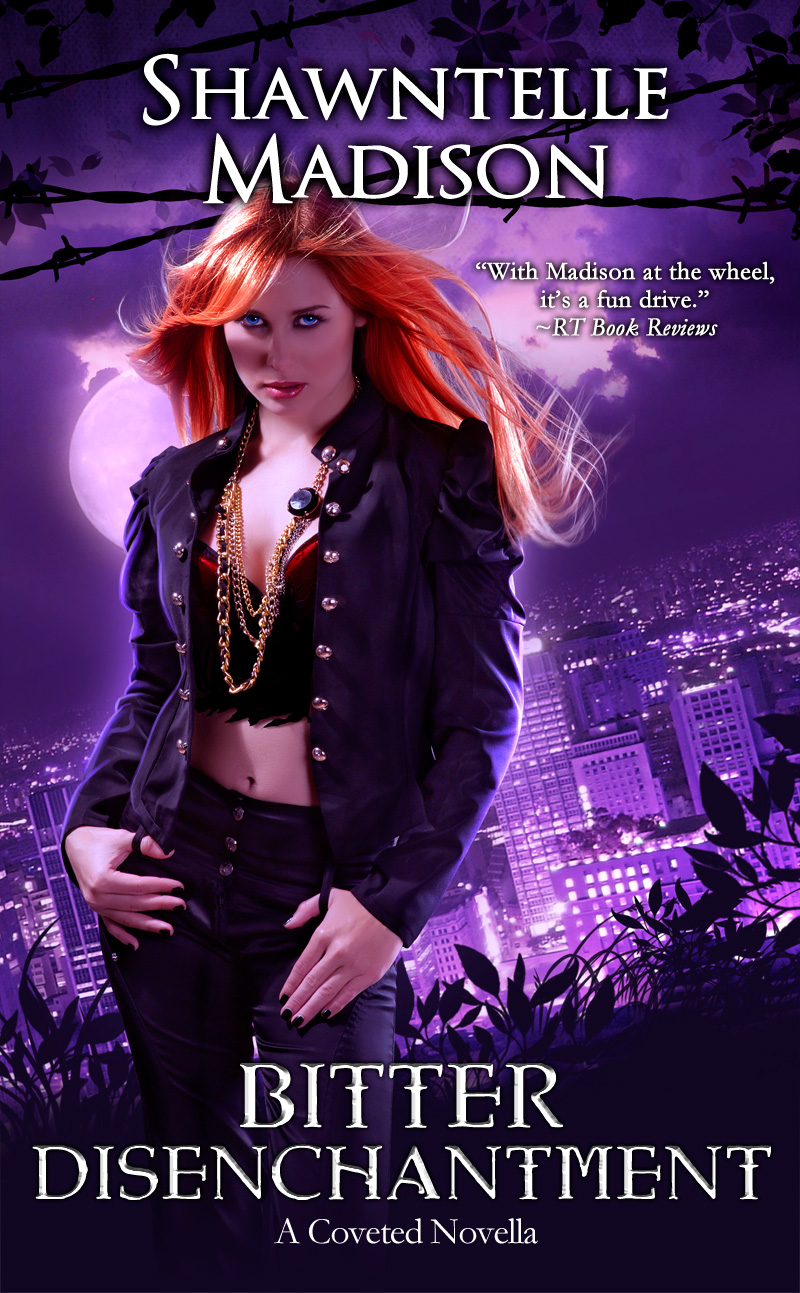Bitter Disenchantment is a prequel to Coveted, which is the first book in the series. In the first book we meet the redheaded Aggie McClure after she had already fled her father and her pack. Bitter Disenchantment focuses on Aggie's background as the former alpha female heir to the McClure pack.
From the outside it would seem that Aggie's life was going reasonably well. Aggie, being the only daughter of Desmond McClure, lives in luxury and even had a great job at her father's company. Her largest worry is what will happen to her mother now that her father has chosen to discard her mother in hopes of getting a male heir. Though Aggie is very dominant, the patriarchal nature of werewolves means that she can never ever lead. Desmond actually tells Aggie, " If only you'd been born a man, you would've made a fine pack leader."
Things take a turn for the worst when Aggie's father announces that he intends to marry her off to Victor, thus breaking his promise to allow her to choose her own mate. Aggie is quite resistant to Victor until he courts her with food, her life long weakness. After Victor decides to romance Aggie with her life long weakness food and they marry, Aggie thinks that things just might work out. Unfortunately for Aggie things take a turn for the worst when Aggie realises that Victor has no feelings for her whatsoever and intends to turn her into a brooding mare for pups, Aggie knows that has no choice but to flee. The problems escalate when Aggie learns that her fathers new wife intends to have her mother killed.
Having read all of the books in the Coveted series before, there was no doubt that Aggie would be successful in her escape. That fact however did not interrupt my pleasure in reading this novella. I have always been curious about Aggie, and Bitter Disenchantment gave us some great insight into her life and what lead to her compulsive eating. It's so easy to understand that with Desmond's cruelty and her inability to have much control over her life why Aggie over eats. This is actually a nice change of pace because over eating in books involving supernaturals is always presented as normal and necessary because of a high metabolism. My only issue is that though Aggie quips about clogging her arteries, there are no real consequences for her over eating. Whenever an addiction becomes the topic of conversation, there needs to be some sort of consequence for it to be taken seriously. The message needs to be conveyed that addiction hurts.
In many books, the controlling nature of male werewolves is something that is heavily romanticized (yes, I'm looking at you Adam Hauptman from the Mercy Thompson series) It is excused as part of their wolf nature and women are expected to cower, or at the very least alter their behaviour to avoid upsetting them. Part of what made me enjoy this short story so much, is that even though Aggie was far from perfect, she was determined to lead her own life and make her own choices at all cost. At no time did Madison make it appear that Victor forcing Aggie to remain in her apartment, and restricting her diet to produce offspring was the least bit acceptable.
As a protagonist, Aggie is extremely strong and in fact, so are the other women. Though Aggie is clearly not ready to mother, her friend Paula was a mother to two. It's clear that life for Paula was extremely hard but she never gave up and was absolutely willing to do anything to ensure that her daughters had every opportunity. It was also a really good commentary on how financially hard it is to raise children on your own. The fact that Aggie in the end had to sacrifice her life for the security of her children speaks of the way in which society lets families led by single women down.
For the first time in this series, Madison introduced a gay character. I wish I could celebrate this addition but Fernando wasn't really well developed and he seemed to function as a confessor for Aggie. We know little about Fernando beyond the fact that he is married and can make great cookies. I can only hope that in later books, Madison will expand upon Fernando's role in the story.
As you might have guessed from this review, I'm a bit of a fanpoodle when it comes to Shawntelle Madison but she deserves all of the praise I can give her. Madison has shown a repeated commitment to including disabled people in her series and to make their struggles relevant. As a disabled woman myself, it means a lot to me to see the struggles of community in a story rather than erased as though we don't exist. Urban fantasy is in the business of selling stories about the hyper able and Madison's work stands as proof that all people can and should be included.
Editors Note: A copy of this book was received from Netgalley


